中国国际经济贸易仲裁委员会章程
贸仲规则
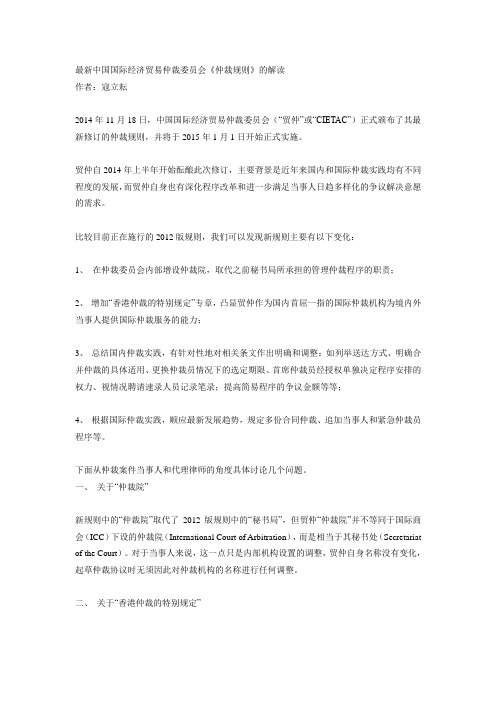
最新中国国际经济贸易仲裁委员会《仲裁规则》的解读作者:寇立耘2014年11月18日,中国国际经济贸易仲裁委员会(“贸仲”或“CIETAC”)正式颁布了其最新修订的仲裁规则,并将于2015年1月1日开始正式实施。
贸仲自2014年上半年开始酝酿此次修订,主要背景是近年来国内和国际仲裁实践均有不同程度的发展,而贸仲自身也有深化程序改革和进一步满足当事人日趋多样化的争议解决意愿的需求。
比较目前正在施行的2012版规则,我们可以发现新规则主要有以下变化:1、在仲裁委员会内部增设仲裁院,取代之前秘书局所承担的管理仲裁程序的职责;2、增加“香港仲裁的特别规定”专章,凸显贸仲作为国内首屈一指的国际仲裁机构为境内外当事人提供国际仲裁服务的能力;3、总结国内仲裁实践,有针对性地对相关条文作出明确和调整:如列举送达方式、明确合并仲裁的具体适用、更换仲裁员情况下的选定期限、首席仲裁员经授权单独决定程序安排的权力、视情况聘请速录人员记录笔录;提高简易程序的争议金额等等;4、根据国际仲裁实践,顺应最新发展趋势,规定多份合同仲裁、追加当事人和紧急仲裁员程序等。
下面从仲裁案件当事人和代理律师的角度具体讨论几个问题。
一、关于“仲裁院”新规则中的“仲裁院”取代了2012版规则中的“秘书局”,但贸仲“仲裁院”并不等同于国际商会(ICC)下设的仲裁院(International Court of Arbitration),而是相当于其秘书处(Secretariat of the Court)。
对于当事人来说,这一点只是内部机构设置的调整,贸仲自身名称没有变化,起草仲裁协议时无须因此对仲裁机构的名称进行任何调整。
二、关于“香港仲裁的特别规定”贸仲2012年设立香港仲裁中心,为选择香港作为仲裁地的当事人提供了新的选择。
毫无疑问,对于那些因与合同对方就争议解决条款争执不下最后被迫让步选择香港作为仲裁地,同时又希望在相对熟悉和了解的环境和模式下进行仲裁程序的内地当事人来讲,选择贸仲香港仲裁中心是再合适不过了。
中国国际贸易促进委员会对外贸易仲裁委员会仲裁程序暂行规则

中国国际贸易促进委员会对外贸易仲裁委员会仲裁程序暂行规则文章属性•【制定机关】中国国际贸易促进委员会•【公布日期】1956.03.31•【文号】•【施行日期】1956.03.31•【效力等级】行业规定•【时效性】已被修改•【主题分类】仲裁正文*注:本篇法规已被修订,新法规名称为《中国国际经济贸易仲裁委员会仲裁规则》(发布日期:1988年9月12日实施日期:1989年1月1日)中国国际贸易促进委员会对外贸易仲裁委员会仲裁程序暂行规则(一九五六年三月三十一日中国国际贸易促进委员会第四次委员会议通过)第一条本规则根据前政务院一九五四年五月六日第二百一十五次政务会议通过的关于在中国国际贸易促进委员会内设立对外贸易仲裁委员会的决定第十二条的规定制定。
第二条对外贸易仲裁委员会(以下简称仲裁委员会)受理对外贸易契约和交易中所发生的争议,特别是外国商号、公司或者其他经济组织同中国商号、公司或者其他经济组织间的争议,但是也可以受理外国商号、公司或者其他经济组织间,以及中国商号、公司或者其他经济组织间有关对外贸易契约和交易中所发生的争议。
前项争议包括一切由于在国外购买、销售商品契约或者委托买卖契约所发生的,由于有关商品的运输、保险、保管、发送所发生的,和其他对外贸易业务上所发生的争议。
第三条仲裁委员会对于前条争议根据双方当事人订定提请仲裁委员会解决的书面协议,并依一方当事人的书面申请予以受理。
前项协议指在原贸易合同或者贸易协议内规定的仲裁条款或者以其他形式(例如特别协议、往来函件、其他有关文件内的特别约定)规定的仲裁协议。
第四条仲裁申请书应当叙明下列各项:一、申诉人和被诉人的名称和地址;二、申诉人的要求和所根据的事实和证据;三、就仲裁委员会委员中选定仲裁员一人的姓名,或者委托仲裁委员会主席代为指定的声明。
第五条仲裁申请书应当附具同申请有关的证件(契约、仲裁协议、当事人往来函件等)原本或者经过证明的副本或者抄本。
第六条申诉人在提出仲裁申请书的时候,应当缴纳为补偿仲裁费用的手续费的预付金,金额是争议金额的百分之零点五。
中国国际经济贸易仲裁委员会仲裁规则(2015版)-中英文对照

3. CIETAC is based in Beijing. It has sub-commissions or arbitration centers (Appendix I). The sub-commissions/arbitration centers are CIETAC’s branches, which accept arbitration applications and administer arbitration cases with CIETAC’s authorization.
China International Economic and Trade Arbitration Commission
CIETAC
Arbitration Rules
《中国国际经济贸易仲裁委员会仲裁规则》

《中国国际经济贸易仲裁委员会仲裁规则》随着全球经济的不断发展,国际贸易的规模和范围不断扩大。
然而,国际贸易中难免会出现纠纷,这些纠纷可能涉及到不同国家、不同文化背景和不同法律制度。
为了解决这些纠纷,国际仲裁成为了一种重要的解决方式。
中国国际经济贸易仲裁委员会(以下简称“CIETAC”)是中国最具代表性的仲裁机构之一,其仲裁规则是国际商事仲裁中的重要法规之一。
一、CIETAC的概述CIETAC是中国政府主管的国际商事仲裁机构,成立于1956年。
其总部位于北京,设有分支机构和代表处。
CIETAC的仲裁规则被广泛应用于国际商事仲裁中,特别是在与中国有关的商事纠纷中。
CIETAC的仲裁裁决得到国际认可,其仲裁机构的专业性、高效性和公正性备受赞誉。
CIETAC的仲裁规则不仅适用于中国国内的仲裁案件,也适用于国际仲裁案件。
二、CIETAC的仲裁规则CIETAC的仲裁规则是指CIETAC用于处理纠纷的一套规则,包括仲裁程序、仲裁庭的组成和程序、证据的提交和审查、裁决的形式和效力等方面的规定。
CIETAC的仲裁规则是一份完整的文书,是CIETAC 仲裁程序中的基本法律文件。
1. 适用范围CIETAC的仲裁规则适用于国际商事仲裁案件和国内商事仲裁案件。
国际商事仲裁案件是指仲裁当事人或仲裁事项涉及两个或两个以上国家或地区的商事活动。
国内商事仲裁案件是指仲裁当事人或仲裁事项均在中国境内的商事活动。
2. 仲裁程序CIETAC的仲裁程序分为四个阶段:仲裁申请、仲裁答辩、听证和裁决。
仲裁申请是仲裁当事人向CIETAC提交仲裁申请书的过程。
仲裁答辩是被申请人向CIETAC提交答辩书的过程。
听证是仲裁庭组成后,召开听证会进行证据交换和辩论的过程。
裁决是仲裁庭根据听证会的结果,最终作出的仲裁裁决。
3. 仲裁庭的组成和程序CIETAC的仲裁庭由仲裁员组成,仲裁员可以由当事人共同提名,也可以由CIETAC指定。
仲裁庭的程序包括仲裁庭组成、仲裁庭的职权和义务、仲裁庭的裁决程序等方面的规定。
中国国际经济贸易仲裁委员会仲裁规则(英文版)

中国国际经济贸易仲裁委员会仲裁规则CHINA INTERNATIONAL ECONOMIC AND TRADE ARBITRATION COMMISSIONARBITRATION RULES(Revised and Adopted by China Chamber of International Commerce on September 4,1995,Effective as from October 1,1995.)Chapter I General ProvisionsSection 1 JurisdictionArticle 1 These Rules are formulated in accordance with the Arbitration Law of the People‟s Republic of China and the provisions of the relevant laws and pursuant to the “Decision ”of the former Government Administration Council of the C entral People‟s Government and the “Notice” and “Official Reply” of the State Council.Article 2 China International Economic and Trade Arbitration Commission (originally named Foreign Trade Arbitration Commission of the China Council for the Promotion of International Trade,later renamed as Foreign Economic and Trade Arbitration Commission of the China Council for the Promotion of International Trade,and presently called China International Economic and Trade Arbitration Commission,hereinafter referred to as the Arbitration Commission)independently and impartially resolves,by means of arbitration,disputes arising from international or foreign-related,contractual or non-contractual,economic and trade transactions,including those disputes between foreign legal persons and/or natural persons and Chinese legal persons and/or natural persons,between foreign legal persons and/or natural persons,and between Chinese legal persons and/or natural persons,in order to protect the legitimate rights and interests of the parties and promote the development of domestic and international economy and trade.In case the law or administrative regulations of the People‟s Republic of China have special provisions or special authorization concerning the scope of accepting cases,the Arbitration Commission may accept cases in accordance with the special provisions or special authorization.Article 3 The Arbitration Commission takes cognizance of cases in accordance with an arbitration agreement between the parties concluded before or after the occurrence of the dispute to refer their dispute to the Arbitration Commission for arbitration and upon the written application by one of the parties.An arbitration agreement means an arbitration clause stipulated by the parties in their contract or a written agreement concluded by the parties in other forms to submit their dispute for arbitration.Article 4 The Arbitration Commission has the power to decide on the existence and validity of an arbitration agreement and the jurisdiction over an arbitration case. If a party challenges thevalidity of the arbitration agreement and requests the Arbitration Commission to make a decision thereupon and the other party applies to the People‟s Court for a ruling,the lather‟s ruling s hall prevail.Article 5 An arbitration clause contained in a contract shall be regarded as existing independently and separately from the other clauses of the contract,and an arbitration agreement attached to a contract shall be treated as a part of the contract existing independently and separately from the other parts of the contract. The validity of an arbitration clause or an arbitration agreement shall not be affected by the modification,rescission,termination,invalidity,revocation or non-existence of the contract.Article 6 Any objections to an arbitration agreement and/or jurisdiction over an arbitration case shall be raised before the first hearing conducted by the arbitration tribunal. Where a case is examined on the basis of documents only,the objections to jurisdiction should be raised before submission of the first substantive defense.Article 7 Once the parties agree to submit their dispute to the Arbitration Commission for arbitration,it shall be deemed that they have agreed to conduct the arbitration under these Rules.Section 2 OrganizationArticle 8 The Arbitration Commission has one honorary Chairman and several advisers.Article 9 The Arbitration Commission is composed of one Chairman,several Vice-Chairmen and a number of Commission members. The Chairman performs the functions and duties vested in him by these Rules and the Vice-Chairmen may perform the Chairman‟s functions and duties with the Chairman‟s authorization.The Arbitration Commission has a secretariat to handle its day-to-day work under the leadership of the Secretary-General of the Arbitration Commission.Article 10 The Arbitration Commission maintains a Panel of Arbitrators. The arbitrators are selected and appointed by the Arbitration Commission from among Chinese and foreign personages with special knowledge and practical experience in the fields of law,economics and trade,science and technology,and other fields.Article 11 The Arbitration Commission is located in Beijing. The Arbitration Commission has a Shenzhen Sub-Commission in Shenzhen Special Economic Zone and a Shanghai Sub-Commission in Shanghai. The Sub-Commissions are an integral part of the Arbitration Commission.The Sub-Commissions have their own secretariats to handle their day-to-day work under the leadership of the Secretaries-General of the Sub-Commissions.These Rules uniformly apply to the Arbitration Commission and its Sub-Commissions. When arbitration proceedings are conducted in the Sub-Commissions,the functions and duties under these Rules to be carried out by the Chairman,the secretariat and the Secretary-General of the Arbitration Commission shall be performed by the Vice-Chairmen authorized by the Chairman,the secretariats and the Secretaries-General of the Sub-Commissions respectively and accordingly.Article 12 The Parties may agree to have their dispute submitted for arbitration conducted by the Arbitration Commission in Beijing or by its Shenzhen Sub-Commission in Shenzhen or by its Shanghai Sub-Commission in Shanghai.In the absence of such an agreement,the Claimant may opt to have the arbitration conducted by the Arbitration Commission in Beijing or by its Shenzhen Sub-Commission in Shenzhen or by its Shanghai Sub-Commission in Shanghai.When exercising such option,the option first made shall prevail. If a dispute arises over the option,it shall be decided by the Arbitration Commission.Chapter II Arbitration ProceedingsSection 1 Application for Arbitration,Defense and Counter-claimArticle 13 The arbitration proceedings shall commence from the date on which the Notice of Arbitration is sent out by the Arbitration Commission or its Sub-Commissions.Article 14 The Claimant shall satisfy the following requirements when submitting his Application for Arbitration:(1)an Application for Arbitration in writing shall be submitted and the following shall be specified in the Application for Arbitration:(a)the name and address of the Claimant and those of the Respondent,including the zip code,telephone number,telex number,fax number and cable number,if any;(b)the arbitration agreement relied upon by the Claimant;(c)the facts of the case and the main points of dispute;(d)the Claimant‟s claim and the facts and evidence on which his claimis based. The Application for Arbitration shall be signed and/or stamped by the Claimant and/or the attorney authorized by the Claimant.(2)When an Application for Arbitration is submitted to the Arbitration Commission,the relevant documentary evidence on which the Claimant‟s claim is based shall accompany the Application for Arbitration.(3)The Claimant shall pay an arbitration fee in advance to the Arbitration Commission according to the Arbitration Fee Schedule of the Arbitration Commission.Article 15 After receipt of the Application for Arbitration and its attachments and when the secretariat of the Arbitration Commission,after examination,deems that the Claimant has not completed the formalities required for arbitration,the secretariat shall demand the Claimant to complete them,and when the secretariat deems that the Claimant has completed the formalities,the secretariat shall immediately send to the Respondent a Notice of Arbitration together with one copy each of the Claimant‟s Application for Arb itration and its attachments as well as the Arbitration Rules,the Panel of Arbitrators and the Arbitration Fee Schedule of the Arbitration Commission,and shall simultaneously send to the Claimant one copy each of the Notice of Arbitration,the Arbitration Rules,the Panel of Arbitrators and Arbitration Fee Schedule.The secretariat of the Arbitration Commission,after sending the Notice of Arbitration to the Claimant and Respondent,the Notice of Arbitration to the Claimant and Respondent,shall appoint one of its staff-members to take charge of procedural administration of the case.Article 16 The Claimant and the Respondent shall,within 20 days as from the date of receipt of the Notice of Arbitration,appoint an arbitrator from among the Panel of Arbitrators of the Arbitration Commission or authorize the Chairman of the Arbitration Commission to make such appointment.Article 17 The Respondent shall,within 45 days from the date of receipt of the Notice of Arbitration,submit his written defense and relevant documentary evidence to the secretariat of the Arbitration Commission.Article 18 The Respondent shall,at the latest within 60 days from the date of receipt of the Notice of Arbitration,lodge with the secretariat of the Arbitration Commission his counterclaim in writing,if any. The arbitration tribunal may extend that time limit if it deems that there are justified reasons.When lodging a counterclaim,the Respondent must state in his written statement of counterclaim his specific claim,reasons for his claim and facts and evidence upon which his claim is based,and attach to his written statement of counterclaim the relevant documentary evidence. When lodging a counterclaim,the Respondent shall pay an arbitration fee in advance according to the Arbitration Fee Schedule of the Arbitration Commission.Article 19 The Claimant may request to amend his claim and the Respondent may request to amend his counterclaim;but the arbitration tribunal may refuse such a request for amendment if it considers that it is too late to raise the request and the amendment may affect the arbitration proceedings.Article 20 When submitting application for arbitration,written defense,statement of counterclaim,documentary evidence and other documents,the party/parties shall submit them in quintuplicate. If the number of the parties exceeds two,additional copies shall be submittedaccordingly;if the number of arbitrator of the arbitration tribunal is one,two copies may be reduced.Article 21 The arbitration proceedings shall not be affected in case the Respondent fails to file his defense in writing or the Claimant fails to submit his written defense against the Respondent‟s counterclaim.Article 22 The parties may authorize arbitration agents to deal with the matters relating to arbitration;the authorized attorney must produce a Power of Attorney to the Arbitration Commission.Chinese and foreign citizens can be authorized to act as arbitration agents.Article 23 When a party applies for property preservative measures,the Arbitration Commission shall transmit the party‟s application for a ruling to the intermediate people‟s court in the place where the domicile of the party against whom the property preservative measures are sought is located or in the place where the property of the said party is located.When a party applies for taking interim measures of protection of evidence,the Arbitration Commission shall transmit the party‟s application for a ruling to the intermediate people‟s court in the place where the evidence is located.Section 2 Formation of Arbitration TribunalArticle 24 Each of the parties shall appoint one arbitrator from among the Panel of Arbitrators of the Arbitration Commission or entrust the Chairman of the Arbitration Commission to make such appointment. The third arbitrator shall be jointly appointed by the parties or appointed by the Chairman of the Arbitration Commission upon the parties… joint authorization. In case the parties fail to jointly entrust the Chairman of the Arbitration Commission to appoint the third arbitrator within 20 days from the date on which the Respondent receives the Notice of Arbitration,the third arbitrator shall be appointed by the Chairman of the Arbitration Commission. The third arbitrator shall act as the presiding arbitrator.The presiding arbitrator and the two appointed arbitrators shall jointly form an arbitration tribunal to jointly hear the case.Article 25 Both parties may jointly appoint or jointly authorize the Chairman of the Arbitration Commission to appoint a sole arbitrator to form an arbitration tribunal to hear the case alone.If both parties have agreed on the appointment of a sole arbitrator to hear their case alone but have failed to agree on the choice of such a sole arbitrator within 20 days from the date on which the Respondent receives the Notice of Arbitration,the Chairman of the Arbitration Commission shall make such appointment.Article 26 If the Claimant or the Respondent fails to appoint or authorize the Chairman of the Arbitration Commission to appoint an arbitrator according to Article 16 of these Rules,the Chairman of the Arbitration Commission shall appoint an arbitrator for the Claimant or the Respondent.Article 27 When there are two or more Claimants and/or Respondents in an arbitration case,the Claimants‟side and/or the Respondents‟ side each shall,through consultation,appoint or entrust the Chairman of the Arbitration Commission to appoint one arbitrator from among the Panel of Arbitrators of the Arbitration Commission.If the Claimants‟ side or the Respondents‟ side fails to make such appointment or entrustment within 20 days as from the date on which the Respondents‟side receives the Notice of Arbitration,the appointment shall be made by the Chairman of the Arbitration Commission.Article 28 Any appointed arbitrator having a personal interest in the case shall himself disclose such circumstances to the Arbitration Commission and request a withdrawal from his office.Article 29 A party may make a request in writing to the Arbitration Commission for the removal of an appointed arbitrator from his office,if the party has justified reasons to suspect the impartiality and independence of the appointed arbitrator. In the request,the facts and reasons on which the request is based and evidence thereof must be given.A challenge against an arbitrator for a removal from his office must be put forward in writing no later than the first oral hearing. If the grounds for the challenge come out or are made known after the first oral hearing,the challenge may be raised after the first hearing but before the end of the last hearing.Article 30 The Chairman of the Arbitration Commission shall decide on the challenge.Article 31 If an arbitrator cannot perform his duty owing to withdrawal,demise,removal or other reasons,a substitute arbitrator shall be appointed in accordance with the procedure pursuant to which the original arbitrator was appointed.After the appointment of the substitute arbitrator,the arbitration tribunal has discretion to decide whether the whole or part of the previous hearings shall be started again.Section 3 HearingArticle 32 The arbitration Tribunal shall hold oral hearings when examining a case. At the request of the parties or with their consent,oral hearings may be omitted if the arbitration tribunal also deems that oral hearings are unnecessary,and then the arbitration tribunal may examine the case and make an award on the basis of documents only.Article 33 The date of the first oral hearing shall be fixed by the arbitration tribunal in consultation with the secretariat of the Arbitration Commission.The notice of the date of the hearing shall be communicated by the secretariat of the Arbitration Commission to the parties 30 days before the date of the hearing. A party having justified reasons may request a postponement of the date of the hearing. His request must be communicated to the secretariat of the Arbitration Commission 12 days before the date of the hearing and the arbitration tribunal shall decide whether to postpone the hearing or not.Article 34 The notice of the date of hearing subsequent to the first hearing is not subject to the 30-day time limit.Article 35 The cases taken cognizance of by the Arbitration Commission shall be heard in Beijing,or in other places with the approval of the Secretary-General of the Arbitration Commission. The cases taken cognizance of by a Sub-Commission of the Arbitration Commission shall be heard in the place where the Sub-Commission is located,or in other places with the approval of the Secretary-General of the Sub-Commission.Article 36 The arbitration tribunal shall not hear cases in open session. If both parties request a hearing to be held in open session,the arbitration tribunal shall decide whether to hold the hearing in open session or not.Article 37 When a case is heard in closed session,the parties,their attorneys,witnesses,arbitrators,experts consulted by the arbitration tribunal and appraisers appointed by the arbitration tribunal and the relevant staff-members of the secretariat of the Arbitration Commission shall not disclose to outsiders the substantive or procedural matters of the case.Article 38 The parties shall produce evidence for the facts on which their claim,defense or counterclaim is based.The arbitration tribunal may undertake investigations and collect evidence on its own initiative,if it deems it necessary.If the arbitration tribunal investigates and collects evidence on its own initiative,it shall timely inform the parties to be present on the spot if it deems it necessary. Should one party or both parties fail to appear on the spot,the investigation and collection of evidence shall by no means be affected.Article 39 The arbitration tribunal may consult an expert or appoint an appraiser for the clarification of special questions relating to the case. Such an expert or appraiser can be an organization or a citizen,Chinese or foreign.The arbitration tribunal has the power to order the parties and the parties are also obliged to submit or produce to the expert or appraiser any materials,documents,properties or goods related to the case for check-up,inspection and/or appraisal.Chapter I General ProvisionsSection 1 JurisdictionArticle 1 These Rules are formulated in accordance with the Arbitration Law of the People‟s Republic of China and the pr ovisions of the relevant laws and pursuant to the “Decision ”of the former Government Administration Council of the Central People‟s Government and the “Notice” and “Official Reply” of the State Council.Article 2 China International Economic and Trade Arbitration Commission (originally named Foreign Trade Arbitration Commission of the China Council for the Promotion of International Trade,later renamed as Foreign Economic and Trade Arbitration Commission of the China Council for the Promotion of International Trade,and presently called China International Economic and Trade Arbitration Commission,hereinafter referred to as the Arbitration Commission)independently and impartially resolves,by means of arbitration,disputes arising from international or foreign-related,contractual or non-contractual,economic and trade transactions,including those disputes between foreign legal persons and/or natural persons and Chinese legal persons and/or natural persons,between foreign legal persons and/or natural persons,and between Chinese legal persons and/or natural persons,in order to protect the legitimate rights and interests of the parties and promote the development of domestic and international economy and trade.In case the law or administrative regula tions of the People‟s Republic of China have special provisions or special authorization concerning the scope of accepting cases,the Arbitration Commission may accept cases in accordance with the special provisions or special authorization.Article 3 The Arbitration Commission takes cognizance of cases in accordance with an arbitration agreement between the parties concluded before or after the occurrence of the dispute to refer their dispute to the Arbitration Commission for arbitration and upon the written application by one of the parties.An arbitration agreement means an arbitration clause stipulated by the parties in their contract or a written agreement concluded by the parties in other forms to submit their dispute for arbitration.Article 4 The Arbitration Commission has the power to decide on the existence and validity of an arbitration agreement and the jurisdiction over an arbitration case. If a party challenges the validity of the arbitration agreement and requests the Arbitration Commission to make a decision thereupon and the other party applies to the People‟s Court for a ruling,the lather‟s ruling shall prevail.Article 5 An arbitration clause contained in a contract shall be regarded as existing independently and separately from the other clauses of the contract,and an arbitration agreement attached to a contract shall be treated as a part of the contract existing independently and separately from the other parts of the contract. The validity of an arbitration clause or anarbitration agreement shall not be affected by the modification,rescission,termination,invalidity,revocation or non-existence of the contract.Article 6 Any objections to an arbitration agreement and/or jurisdiction over an arbitration case shall be raised before the first hearing conducted by the arbitration tribunal. Where a case is examined on the basis of documents only,the objections to jurisdiction should be raised before submission of the first substantive defense.Article 7 Once the parties agree to submit their dispute to the Arbitration Commission for arbitration,it shall be deemed that they have agreed to conduct the arbitration under these Rules.Section 2 OrganizationArticle 8 The Arbitration Commission has one honorary Chairman and several advisers.Article 9 The Arbitration Commission is composed of one Chairman,several Vice-Chairmen and a number of Commission members. The Chairman performs the functions and duties vested in him by these Rules and the Vice-Chairmen may perform the Chai rman‟s functions and duties with the Chairman‟s authorization.The Arbitration Commission has a secretariat to handle its day-to-day work under the leadership of the Secretary-General of the Arbitration Commission.Article 10 The Arbitration Commission maintains a Panel of Arbitrators. The arbitrators are selected and appointed by the Arbitration Commission from among Chinese and foreign personages with special knowledge and practical experience in the fields of law,economics and trade,science and technology,and other fields.Article 11 The Arbitration Commission is located in Beijing. The Arbitration Commission has a Shenzhen Sub-Commission in Shenzhen Special Economic Zone and a Shanghai Sub-Commission in Shanghai. The Sub-Commissions are an integral part of the Arbitration Commission.The Sub-Commissions have their own secretariats to handle their day-to-day work under the leadership of the Secretaries-General of the Sub-Commissions.These Rules uniformly apply to the Arbitration Commission and its Sub-Commissions. When arbitration proceedings are conducted in the Sub-Commissions,the functions and duties under these Rules to be carried out by the Chairman,the secretariat and the Secretary-General of the Arbitration Commission shall be performed by the Vice-Chairmen authorized by the Chairman,the secretariats and the Secretaries-General of the Sub-Commissions respectively and accordingly.Article 12 The Parties may agree to have their dispute submitted for arbitration conducted by the Arbitration Commission in Beijing or by its Shenzhen Sub-Commission in Shenzhen or by its Shanghai Sub-Commission in Shanghai.In the absence of such an agreement,the Claimant may opt to have the arbitration conducted by the Arbitration Commission in Beijing or by its Shenzhen Sub-Commission in Shenzhen or by its Shanghai Sub-Commission in Shanghai.When exercising such option,the option first made shall prevail. If a dispute arises over the option,it shall be decided by the Arbitration Commission.Chapter II Arbitration ProceedingsSection 1 Application for Arbitration,Defense and Counter-claimArticle 13 The arbitration proceedings shall commence from the date on which the Notice of Arbitration is sent out by the Arbitration Commission or its Sub-Commissions.Article 14 The Claimant shall satisfy the following requirements when submitting his Application for Arbitration:(1)an Application for Arbitration in writing shall be submitted and the following shall be specified in the Application for Arbitration:(a)the name and address of the Claimant and those of the Respondent,including the zip code,telephone number,telex number,fax number and cable number,if any;(b)the arbitration agreement relied upon by the Claimant;(c)the facts of the case and the main points of dispute;(d)the Claimant‟s claim and the facts and evidence on which his claimis based. The Application for Arbitration shall be signed and/or stamped by the Claimant and/or the attorney authorized by the Claimant.(2)When an Application for Arbitration is submitted to the Arbitration Commission,the relevant documentary evidence on which the Claimant‟s claim is based shall accompany the Application for Arbitration.(3)The Claimant shall pay an arbitration fee in advance to the Arbitration Commission according to the Arbitration Fee Schedule of the Arbitration Commission.Article 15 After receipt of the Application for Arbitration and its attachments and when the secretariat of the Arbitration Commission,after examination,deems that the Claimant has not completed the formalities required for arbitration,the secretariat shall demand the Claimant to complete them,and when the secretariat deems that the Claimant has completed the formalities,the secretariat shall immediately send to the Respondent a Notice of Arbitration together with one copy each of the Claimant‟s Application for Arbitration and its attachments as well as the Arbitration Rules,the Panel of Arbitrators and the Arbitration Fee Schedule of the ArbitrationCommission,and shall simultaneously send to the Claimant one copy each of the Notice of Arbitration,the Arbitration Rules,the Panel of Arbitrators and Arbitration Fee Schedule.The secretariat of the Arbitration Commission,after sending the Notice of Arbitration to the Claimant and Respondent,the Notice of Arbitration to the Claimant and Respondent,shall appoint one of its staff-members to take charge of procedural administration of the case.Article 16 The Claimant and the Respondent shall,within 20 days as from the date of receipt of the Notice of Arbitration,appoint an arbitrator from among the Panel of Arbitrators of the Arbitration Commission or authorize the Chairman of the Arbitration Commission to make such appointment.Article 17 The Respondent shall,within 45 days from the date of receipt of the Notice of Arbitration,submit his written defense and relevant documentary evidence to the secretariat of the Arbitration Commission.Article 18 The Respondent shall,at the latest within 60 days from the date of receipt of the Notice of Arbitration,lodge with the secretariat of the Arbitration Commission his counterclaim in writing,if any. The arbitration tribunal may extend that time limit if it deems that there are justified reasons.When lodging a counterclaim,the Respondent must state in his written statement of counterclaim his specific claim,reasons for his claim and facts and evidence upon which his claim is based,and attach to his written statement of counterclaim the relevant documentary evidence. When lodging a counterclaim,the Respondent shall pay an arbitration fee in advance according to the Arbitration Fee Schedule of the Arbitration Commission.Article 19 The Claimant may request to amend his claim and the Respondent may request to amend his counterclaim;but the arbitration tribunal may refuse such a request for amendment if it considers that it is too late to raise the request and the amendment may affect the arbitration proceedings.Article 20 When submitting application for arbitration,written defense,statement of counterclaim,documentary evidence and other documents,the party/parties shall submit them in quintuplicate. If the number of the parties exceeds two,additional copies shall be submitted accordingly;if the number of arbitrator of the arbitration tribunal is one,two copies may be reduced.Article 21 The arbitration proceedings shall not be affected in case the Respondent fails to file his defense in writing or the Claimant fails to submit his written defense against the Respondent‟s counterclaim.Article 22 The parties may authorize arbitration agents to deal with the matters relating to arbitration;the authorized attorney must produce a Power of Attorney to the Arbitration Commission.。
中国国际经济贸易仲裁委员会仲裁规则

【发布单位】国际经济贸易仲裁委员会【发布文号】-----------【发布日期】2000-10-01【生效日期】2000-10-01【失效日期】----------【所属类别】国家法律法规中国国际经济贸易仲裁委员会仲裁规则(中国国际贸易促进委员会、中国国际商会2000年9月5日修订并通过,2000年10月1日起施行)第一章总则第一节管辖第一条根据《中华人民共和国仲裁法》和有关法律的规定以及原中央人民政府政务院的《决定》和国务院的《通知》及《批复》,制定本仲裁规则。
第二条中国国际经济贸易仲裁委员会(原名中国国际贸易促进委员会对外贸易仲裁委员会,后名中国国际贸易促进委员会对外经济贸易仲裁委员会,现名中国国际经济贸易仲裁委员会,以下简称仲裁委员会)以仲裁的方式,独立、公正地解决契约性或非契约性的经济贸易等争议。
前款所述争议包括:(一)国际的或涉外的争议;(二)涉及香港特别行政区、澳门特别行政区或台湾地区的争议;(三)外商投资企业相互之间以及外商投资企业与中国其他法人、自然人及/或经济组织之间的争议;(四)涉及中国法人、自然人及/或其他经济组织利用外国的、国际组织的或香港特别行政区、澳门特别行政区、台湾地区的资金、技术或服务进行项目融资、招标投标、工程建筑等活动的争议;(五)中华人民共和国法律、行政法规特别规定或特别授权由仲裁委员会受理的争议;(六)当事人协议由仲裁委员会仲裁的其它国内争议。
仲裁委员会不受理下列争议:(一)婚姻、收养、监护、扶养、继承争议;(二)依法应当由行政机关处理的行政争议;(三)劳动争议和农业集体经济组织内部的农业承包合同争议。
第三条仲裁委员会根据当事人在争议发生之前或者在争议发生之后达成的将争议提交仲裁委员会仲裁的仲裁协议和一方当事人的书面申请,受理案件。
仲裁协议系指当事人在合同中订明的仲裁条款,或者以其他方式达成的提交仲裁的书面协议。
第四条仲裁委员会有权对仲裁协议的存在、效力以及仲裁案件的管辖权作出决定。
中国国际经济贸易仲裁委员会、中国海事仲裁委员会仲裁员守则(1994年修订)

中国国际经济贸易仲裁委员会、中国海事仲裁委员会仲裁员守则(1994年修订)文章属性•【制定机关】中国国际经济贸易仲裁委员会,中国海事仲裁委员会•【公布日期】1994.05.06•【文号】•【施行日期】1994.05.06•【效力等级】行业规定•【时效性】现行有效•【主题分类】仲裁正文中国国际经济贸易仲裁委员会、中国海事仲裁委员会仲裁员守则(1993年4月6日通过1994年5月6日修订)一、仲裁员应当根据事实,依照法律,参考国际惯例,并遵循公平合理原则独立公正地审理案件。
二、仲裁员不代表任何一方当事人,应当平等地对待双方当事人。
三、仲裁员名册中的任何人事先与一方当事人讨论过案件的,或提出过咨询意见的,不得担任该案仲裁员。
四、仲裁员在任职期间不得收受当事人的馈赠,不得与一方当事人单独会见讨论有关案件的情况或接受有关案件的材料,在调解过程中仲裁庭决定仲裁员与一方当事人单独会见的除外。
五、仲裁员本人认为与案件有利害关系的或其他关系而有可能影响案件公正审理的,应当向仲裁委员会披露与当事人的关系的情况,如直系亲属、债务、财产与金钱关系、业务及商业合作关系等,应当自动请求回避。
六、仲裁员应当严格按照仲裁规则的程序审理案件,应当给予当事人充分陈述意见的机会。
七、仲裁员接受指定后,应当保证开庭审理和合议的时间,不得因其它情事影响案件的审理,遇有特殊情况应提前商秘书处。
八、仲裁员应当认真详细审阅案件的全部文件和材料,找出问题所在。
九、在开庭审理之前仲裁员应当参与讨论、商定审理方案;首席仲裁员应当提出审理方案的设想,作为讨论的基础。
仲裁庭由独任仲裁员组成时,独任仲裁员应当在开庭审理前拟妥审理方案。
十、在开庭审理时,仲裁员不得出现倾向性,注意提问和表达意见的方式方法,避免对关键性问题作出过早的结论,避免出现与当事人争议或对峙的局面。
十一、在开庭审理结束后首席仲裁员应当无延迟地主持合议,提出下一步程序进行的意见或裁决书起草的意见。
中国国际贸易促进委员会章程

第五条 中国贸促会系法人。可以同各国、各地区有关组织和机构、国际组织签订促进贸易、投资和经济技 术合作的协议、议定书和其他文件。
第六条 中国贸促会会址设在北京。
第七条 在中华人民共和国县以上行政区域内可以设立地方贸促机构,在国内有关行业可设立行业贸促机构。 中国贸促会指导和协调地方、行业贸促机构的工作。
中国国际贸易促进委员会章程
20xx年中国贸促会第五届委员会议发 布的文件
目录
01 第一章总则
03 第三章全国委员会
02 第二章职责 04 第四章组织
目录
05 第五章财务
07
第七章仲裁和调解机 构
06
第六章地方、行业贸 促机构
08 第八章附则
《中国国际贸易促进委员会章程》经中国贸促会第五届委员会议讨论通过,于2015年2月1日起施行。
第十八条地方、行业贸促机构设立地方委员会,其委员由该地方或行业中有代表性的人士、企业、机构和团 体组成。
第十九条地方、行业贸促机构的宗旨是,开展促进该地区、该行业与世界各国、各地区之间的贸易、投资和 经济技术合作活动,增进中国人民同世界各国、各地区人民和经济贸易界的相互了解与友谊。
第二十条地方、行业贸促机构系独立的法人,可依照本章程的规定独立开展业务,对外签订有关促进经济贸 易的协议、议定书和其他文件。
第一章总则
第一条中国国际贸易促进委员会,简称中国贸促会,英文名称为CHINA COUNCIL FOR THE PROMOTION OF INTERNATIONAL TRADE,英文简称CCPIT。
第二条中国贸促会是由中国经济贸易界有代表性的人士、企业和团体组成的全国民间对外经济贸易组织。
中国国际经济贸易仲裁委员会仲裁规则(2015版)-中英文对照
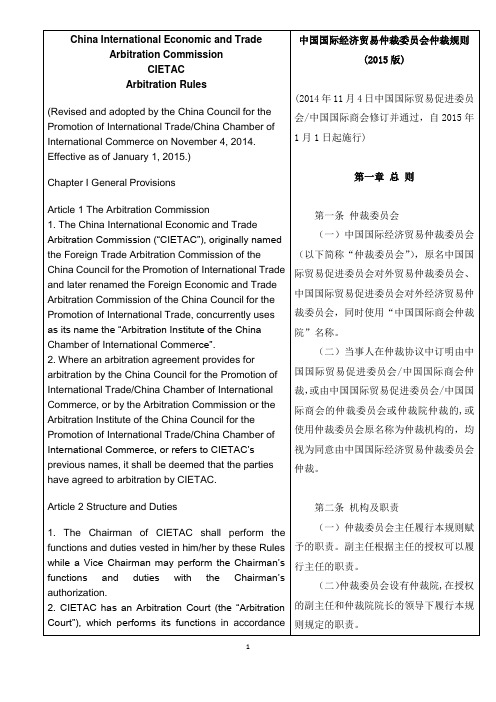
4. A sub-commission/arbitration center has an arbitration court, which performs the functions of the Arbitration Court in accordance with these Rules under the direction of the president of the arbitration court of the sub-commission/arbitration center.
3. CIETAC is based in Beijing. It has sub-commissions or arbitration centers (Appendix I). The sub-commissions/arbitration centers are CIETAC’s branches, which accept arbitration applications and administer arbitration cases with CIETAC’s authorization.
会员委裁仲易贸济经际国国中

中国国际经济贸易仲裁委员会该仲裁委员会设立了以下若干内部组织机构:1.委员和委员会议。
仲裁委员会委员由仲裁委员会聘请经济贸易、法律等方面的专家人士担任,每届任期3年。
仲裁委员会委员通过仲裁委员会委员会议来行使其职权,委员会议每年召开一次,如有需要,也可以召开临时会议。
仲裁委员会每次委员会议,须有半数以上的委员出席方能进行,会议由委员会议主席或者主席授权的副主席主持召开。
会议形成决议时,须由半数以上的委员通过才有效。
仲裁委员会委员会议的主要任务是:审议、通过仲裁委员会秘书长提出的年度工作报告;审议、通过关于制定和修改仲裁委员会仲裁规则的草案,并报中国国际贸易促进委员会核准通过;制订和修仲裁委员会的章程;讨论有关仲裁委员会的工作方式、政策等重要事项并形成相应的决议。
2.主任会议。
仲裁委员会由主任1人、副主任2人至4人和委员7人至11人组成。
仲裁委员会的主任、副主任和委员由法律、经济贸易专家和有实际经验的人员担任。
仲裁委员会和仲裁委员会分会的主任、副主任和秘书长分别组成仲裁委员会和仲裁委员会分会的主任会议,在仲裁委员会议闭会期间,分别负责仲裁委员会和仲裁委员会分会的工作。
3.仲裁咨询委员会。
在仲裁委员会内部设立专家咨询委员会,由仲裁委员会主任会议决定聘请5名至15名专家组成,该专家咨询委员会设主任委员人,由仲裁委员会副主任兼任。
4.秘书局(处)。
仲裁委员会设秘书局,仲裁委员会分会设秘书处,分别负责仲裁委员会和分会的日常事务,包括受理案件的登记管理,仲裁费用的收取,仲裁程序的管理,非仲裁庭调解案件的调解等。
5.秘书长会议。
6.仲裁研究所。
省人民政府水行政主管部门建立水土保持监测网络,对全省水土流失动态进行监测、预报,省人民政府定期将监测、预报情况予以公告。
县级以上人民政府水行政主管部门及其所属的水土保持监督管理机构,应当建立执法监督体系,对《中华人民共和国水土保持法》和《中华人民共和国水土保持法实施条例》及本办法的执行情况实施监督检查。
中国国际经济贸易仲裁委员会仲裁规则-

中国国际经济贸易仲裁委员会仲裁规则正文:---------------------------------------------------------------------------------------------------------------------------------------------------- 中国国际经济贸易仲裁委员会仲裁规则(1988年9月12日中国国际贸易促进委员会第一届第三次委员会会议通过)第一章总则第一节管辖第一条中国国际经济贸易仲裁委员会(以下简称仲裁委员会)以仲裁的方式,独立、公正地解决产生于国际经济贸易中的争议,以保护当事人的正当权益,促进国际经济贸易的发展。
第二条仲裁委员会根据当事人在争议发生之前或者在争议发生之后达成的将争议提交仲裁委员会仲裁的仲裁协议和一方当事人的书面申请,受理产生于国际经济贸易中的争议案件。
仲裁协议系指当事人在合同中订立的仲裁条款,或者以其他方式达成的提交仲裁的书面协议。
仲裁委员会有权就仲裁协议的有效性和仲裁案件的管辖权作出决定。
第二节组织第三条仲裁委员会由主席一人、副主席若干人和委员若干人组成。
主席履行本仲裁规则赋予的职责,副主席受主席委托可以履行主席的职责。
仲裁委员会设秘书处,负责处理仲裁委员会的日常事务。
第四条仲裁委员会设立仲裁员名册,仲裁员由中国国际贸易促进委员会从对国际经济贸易、科学技术和法律等方面具有专门知识和实际经验的中外人士中聘任。
第五条仲裁委员会设在北京。
根据仲裁业务发展的需要,仲裁委员会可以在中国境内其他地方设立仲裁委员会分会。
第二章仲裁程序第一节仲裁申请、答辩和反诉第六条申诉人必须按照下列要求向仲裁委员会提出仲裁申请:(一)向仲裁委员会提交仲裁申请书。
仲裁申请书应当写明:1、申诉人和被诉人的名称、地址;2、申诉人所依据的仲裁协议;3、申诉人的要求及所依据的事实和证据。
仲裁申请书应当由申诉人及/或申诉人授权的代理人签名。
中国国际经济贸易仲裁委员会、中国海事仲裁委员会关于聘任仲裁员的规定(2005年修订)-
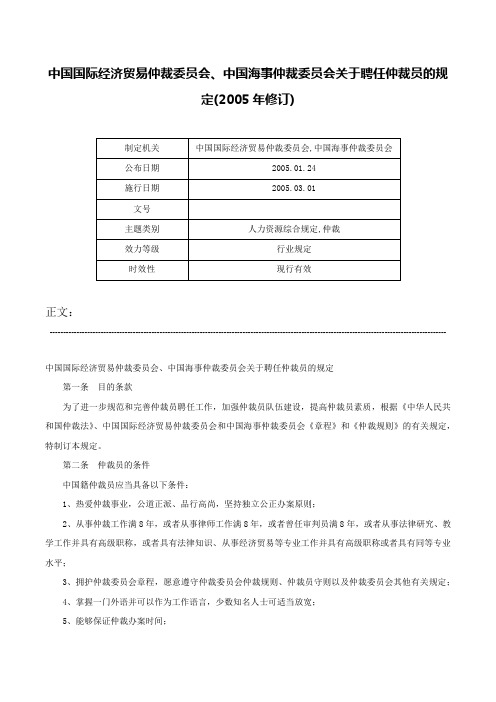
中国国际经济贸易仲裁委员会、中国海事仲裁委员会关于聘任仲裁员的规定(2005年修订)正文:----------------------------------------------------------------------------------------------------------------------------------------------------中国国际经济贸易仲裁委员会、中国海事仲裁委员会关于聘任仲裁员的规定第一条目的条款为了进一步规范和完善仲裁员聘任工作,加强仲裁员队伍建设,提高仲裁员素质,根据《中华人民共和国仲裁法》、中国国际经济贸易仲裁委员会和中国海事仲裁委员会《章程》和《仲裁规则》的有关规定,特制订本规定。
第二条仲裁员的条件中国籍仲裁员应当具备以下条件:1、热爱仲裁事业,公道正派、品行高尚,坚持独立公正办案原则;2、从事仲裁工作满8年,或者从事律师工作满8年,或者曾任审判员满8年,或者从事法律研究、教学工作并具有高级职称,或者具有法律知识、从事经济贸易等专业工作并具有高级职称或者具有同等专业水平;3、拥护仲裁委员会章程,愿意遵守仲裁委员会仲裁规则、仲裁员守则以及仲裁委员会其他有关规定;4、掌握一门外语并可以作为工作语言,少数知名人士可适当放宽;5、能够保证仲裁办案时间;6、仲裁委员会规定的其他条件。
外籍仲裁员应当具备以下条件:1、热爱仲裁事业,公道正派、品性高尚,坚持独立公正办案原则;2、具有法律、经济贸易、科学技术或海商海事等专业知识和实际工作经验;3、拥护仲裁委员会章程,愿意遵守仲裁委员会仲裁规则、仲裁员守则以及仲裁委员会其他有关规定;4、掌握一定的中文知识,少数知名人士可适当放宽;5、仲裁委员会规定的其他条件。
在港澳台人士中聘任仲裁员,参照外籍仲裁员条件。
第三条仲裁员的申请申请担任仲裁委员会仲裁员的,应当向仲裁委员会提交下列文件,并确保提供材料的真实、准确:1、申请书和简历2、一至两名仲裁委员会仲裁员、专家或者教授的书面推荐意见,少数国内和国际知名人士可不提交推荐意见;3、必要时,应提交所在单位的书面意见。
《中国国际经济贸易仲裁委员会仲裁规则》

《中国国际经济贸易仲裁委员会仲裁规则》一、前言随着全球化的发展,国际贸易和投资的规模不断扩大,各国间的经济联系日益紧密。
然而,在跨国经济交往中,由于涉及的国家、地区、文化、法律等因素不同,往往会涌现出一些纠纷。
针对此类纠纷,常常需要采取仲裁等非诉讼方式来解决。
中国国际经济贸易仲裁委员会(下称“CIETAC”)作为中国知名的、非政府性质的国际商事仲裁机构,具有公正、独立、高效等优势,其仲裁规则也日益广受赞誉。
二、CIETAC简介CIETAC成立于1956年,是中国唯一的由司法部授权、独立运作的对外经济贸易仲裁机构,总部设在北京。
CIETAC每年受理的仲裁案件超过2000件,涉及面广泛,包括商业合同、出口合同、技术合同、股权纠纷、投资争议等等。
CIETAC在国内外的仲裁裁决都具有法律效力。
三、CIETAC仲裁规则为有效维护仲裁的公正性和效力,CIETAC制定了《中国国际经济贸易仲裁委员会仲裁规则》(下称“规则”),并不断根据实践经验进行修改和完善。
该规则包含了仲裁债权、章程、仲裁程序、临时仲裁以及监督程序等内容,旨在确保仲裁的公正、公正和效力。
(一)仲裁程序CIETAC规则明确了仲裁程序的重要环节,包括仲裁通知、仲裁答辩,仲裁程序和仲裁裁决等。
仲裁通知以及答辩是仲裁程序的重要开端,要求仲裁当事人通知对方仲裁事项,并提供相关证据等。
仲裁程序包括了仲裁庭组成、仲裁庭听证、口头审理等,以确保对当事人的权益保护。
仲裁裁决则是仲裁程序的最终结果,规定仲裁委员会需要签发仲裁裁决书,并按照仲裁裁决的内容执行最终判决。
(二)远程仲裁当事人因地域、时间等原因无法到达仲裁机构进行仲裁时,CIETAC完善了远程仲裁制度。
即采取视频、邮件等方式进行仲裁,实现了更加高效、便捷的仲裁方式。
(三)保全措施在仲裁过程中,为了保护当事人的财产权益,规定了一些保全措施。
例如,可以向法院申请冻结被告的银行账户、股票账户等措施,确保最终判决能够得到执行。
中国国际经济贸易仲裁委员会
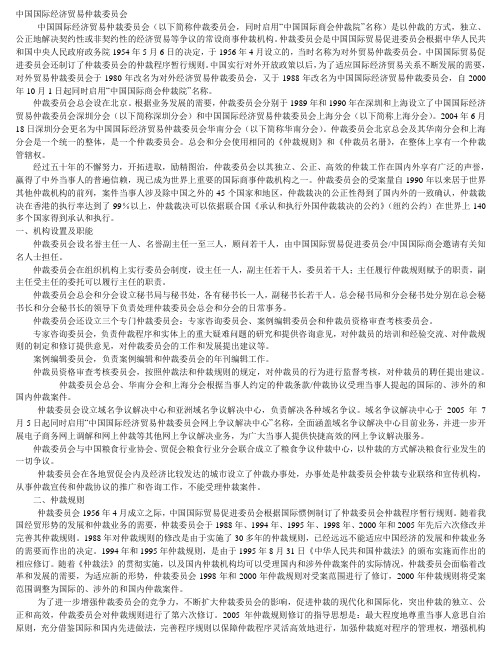
中国国际经济贸易仲裁委员会中国国际经济贸易仲裁委员会(以下简称仲裁委员会,同时启用“中国国际商会仲裁院”名称)是以仲裁的方式,独立、公正地解决契约性或非契约性的经济贸易等争议的常设商事仲裁机构。
仲裁委员会是中国国际贸易促进委员会根据中华人民共和国中央人民政府政务院1954年5月6日的决定,于1956年4月设立的,当时名称为对外贸易仲裁委员会。
中国国际贸易促进委员会还制订了仲裁委员会的仲裁程序暂行规则。
中国实行对外开放政策以后,为了适应国际经济贸易关系不断发展的需要,对外贸易仲裁委员会于1980年改名为对外经济贸易仲裁委员会,又于1988年改名为中国国际经济贸易仲裁委员会,自2000年10月1日起同时启用“中国国际商会仲裁院”名称。
仲裁委员会总会设在北京。
根据业务发展的需要,仲裁委员会分别于1989年和1990年在深圳和上海设立了中国国际经济贸易仲裁委员会深圳分会(以下简称深圳分会)和中国国际经济贸易仲裁委员会上海分会(以下简称上海分会)。
2004年6月18日深圳分会更名为中国国际经济贸易仲裁委员会华南分会(以下简称华南分会)。
仲裁委员会北京总会及其华南分会和上海分会是一个统一的整体,是一个仲裁委员会。
总会和分会使用相同的《仲裁规则》和《仲裁员名册》,在整体上享有一个仲裁管辖权。
经过五十年的不懈努力,开拓进取,励精图治,仲裁委员会以其独立、公正、高效的仲裁工作在国内外享有广泛的声誉,赢得了中外当事人的普遍信赖,现已成为世界上重要的国际商事仲裁机构之一。
仲裁委员会的受案量自1990年以来居于世界其他仲裁机构的前列,案件当事人涉及除中国之外的45个国家和地区,仲裁裁决的公正性得到了国内外的一致确认,仲裁裁决在香港的执行率达到了99%以上,仲裁裁决可以依据联合国《承认和执行外国仲裁裁决的公约》(纽约公约)在世界上140多个国家得到承认和执行。
一、机构设置及职能仲裁委员会设名誉主任一人、名誉副主任一至三人,顾问若干人,由中国国际贸易促进委员会/中国国际商会邀请有关知名人士担任。
中国国际经济贸易仲裁委员会仲裁规则

中国国际经济贸易仲裁委员会仲裁规则中国国际经济贸易仲裁委员会仲裁规则(《仲裁规则》),为各方解决国际经济贸易纠纷提供快捷、高效、公平义利的仲裁机制。
《仲裁规则》收集、整理和运用国际仲裁的普遍原则、准则和国际惯例,完善中国国际经济贸易仲裁委员会的仲裁机制,以实现中国对经济贸易仲裁的更加高效、更加及时的执行。
《仲裁规则》经历了数次修订,目前正式实施的版本为2013年修订的第九次版本。
新版《仲裁规则》包括实施细则和实施方案,旨在以多种方式调和仲裁的过程,以降低仲裁费用,减少仲裁期限,提高仲裁效率。
《仲裁规则》的主要内容《仲裁规则》的主要内容包括:(1)仲裁受理与裁决:根据当事人的意愿,仲裁委员会仲裁受理仲裁时应注意的原则;关于仲裁裁决的内容、形式和有效性;仲裁裁决的履行及其终止;仲裁无效性或无可履行性的裁定;关于仲裁程序等有关规定。
(2)仲裁庭:对仲裁庭的成员以及仲裁庭决定的原则;仲裁庭决定的有效性和执行以及变更、终止的规定等。
(3)仲裁程序:包括庭外审理程序;法定仲裁期限;开庭审理程序;付款要求程序;仲裁庭决定审查程序;仲裁庭成员更换程序等。
(4)其他事项:关于国际仲裁会议会场的召开;仲裁机构可享受的特殊权利及免除的义务;仲裁费用收取及其管理等。
《仲裁规则》的重要性《仲裁规则》既促进了仲裁机制的发展,也促进了国际经济贸易仲裁的社会性效应,起到了良好的社会效益。
首先,《仲裁规则》旨在促进司法问责,把法律制度融入仲裁程序,提高仲裁精确性和及时性,促进仲裁结果的执行。
其次,《仲裁规则》将仲裁程序与中国传统文化及现代仲裁技术等元素相结合,构建了一套同时融入中国文化特色的仲裁机制,使仲裁在传统的中国文化框架内展开,对国内社会发展非常有益。
最后,《仲裁规则》改善和完善了国际仲裁的仲裁机制,为国家提供了一种有效的促进国际经济贸易秩序的有效措施。
综上所述,中国国际经济贸易仲裁委员会仲裁规则(《仲裁规则》)对中国社会发展具有重要意义,对国际经济贸易秩序也有着独特的作用。
中国国际经济贸易仲裁委员会简介
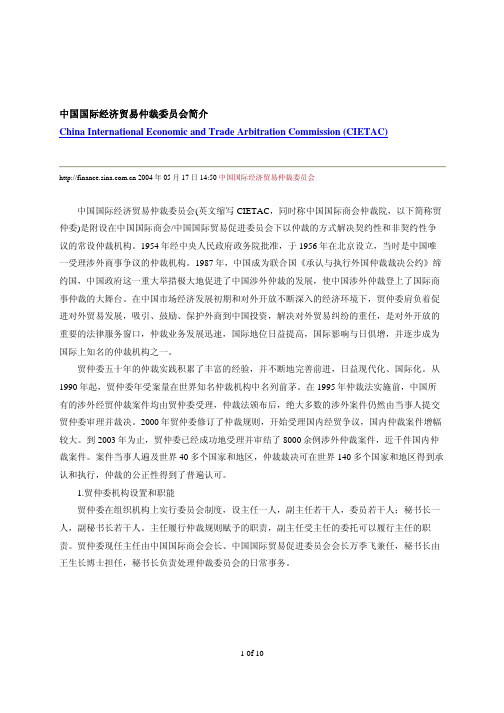
中国国际经济贸易仲裁委员会简介China International Economic and Trade Arbitration Commission (CIETAC) 2004年05月17日 14:50 中国国际经济贸易仲裁委员会中国国际经济贸易仲裁委员会(英文缩写CIETAC,同时称中国国际商会仲裁院,以下简称贸仲委)是附设在中国国际商会/中国国际贸易促进委员会下以仲裁的方式解决契约性和非契约性争议的常设仲裁机构。
1954年经中央人民政府政务院批准,于1956年在北京设立,当时是中国唯一受理涉外商事争议的仲裁机构。
1987年,中国成为联合国《承认与执行外国仲裁裁决公约》缔约国,中国政府这一重大举措极大地促进了中国涉外仲裁的发展,使中国涉外仲裁登上了国际商事仲裁的大舞台。
在中国市场经济发展初期和对外开放不断深入的经济环境下,贸仲委肩负着促进对外贸易发展,吸引、鼓励、保护外商到中国投资,解决对外贸易纠纷的重任,是对外开放的重要的法律服务窗口,仲裁业务发展迅速,国际地位日益提高,国际影响与日俱增,并逐步成为国际上知名的仲裁机构之一。
贸仲委五十年的仲裁实践积累了丰富的经验,并不断地完善前进,日益现代化、国际化。
从1990年起,贸仲委年受案量在世界知名仲裁机构中名列前茅。
在1995年仲裁法实施前,中国所有的涉外经贸仲裁案件均由贸仲委受理,仲裁法颁布后,绝大多数的涉外案件仍然由当事人提交贸仲委审理并裁决。
2000年贸仲委修订了仲裁规则,开始受理国内经贸争议,国内仲裁案件增幅较大。
到2003年为止,贸仲委已经成功地受理并审结了8000余例涉外仲裁案件,近千件国内仲裁案件。
案件当事人遍及世界40多个国家和地区,仲裁裁决可在世界140多个国家和地区得到承认和执行,仲裁的公正性得到了普遍认可。
1.贸仲委机构设置和职能贸仲委在组织机构上实行委员会制度,设主任一人,副主任若干人,委员若干人;秘书长一人,副秘书长若干人。
- 1、下载文档前请自行甄别文档内容的完整性,平台不提供额外的编辑、内容补充、找答案等附加服务。
- 2、"仅部分预览"的文档,不可在线预览部分如存在完整性等问题,可反馈申请退款(可完整预览的文档不适用该条件!)。
- 3、如文档侵犯您的权益,请联系客服反馈,我们会尽快为您处理(人工客服工作时间:9:00-18:30)。
第一条中国国际经济贸易仲裁委员会(原名中国国际贸易促进委员会对外贸易仲裁委员会,后名中国国际贸易促进委员会对外经济贸易仲裁委员会,现名中国国际经济贸易仲裁委员会,以下简称仲裁委员会)是中国国际贸易促进委员会/中国国际商会依法组织设立的处理契约性或非契约性的经济贸易等争议的仲裁机构。
仲裁委员会同时使用“中国国际商会仲裁院”名称。
第二条仲裁委员会的主要业务是:(一)受理平等主体的公民、法人和其他组织之间的国际/涉外仲裁案件及国内仲裁案件,包括香港特别行政区、澳门特别行政区或台湾地区的仲裁案件;(二)受理由政府或其它国内外组织授权仲裁委员会处理的争议案件;(三)提供当事人约定由仲裁委员会处理的其它争议解决服务;(四)根据当事人的约定和请求,为在境外进行的非机构仲裁指定仲裁员;(五)宣传推广和研究仲裁及其它非诉讼解决争议的方式方法;(六)开展国内外业务交流,参加相关的国内外组织。
第三条仲裁委员会由主任一人、副主任若干人及委员若干人组成。
仲裁委员会设秘书长一人及副秘书长若干人。
主任、副主任和委员由中国国际贸易促进委员会/中国国际商会聘请有关方面的专家和知名人士担任,每届任期三年;如有必要,任期可做适当调整。
秘书长和副秘书长由仲裁委员会主任聘任。
秘书长和副秘书长人选的年龄不应超过五十五岁。
第四条仲裁委员会设名誉主任一人、名誉副主任一至三名及顾问若干人,由中国国际贸易促进委员会/中国国际商会邀请有关知名人士担任。
第五条仲裁委员会委员会议每年召开一次;如有需要,可以召开临时会议。
仲裁委员会委员会议,由仲裁委员会主任或主任授权的副主任主持召开。
每次会议须有半数以上委员包括主任及/或副主任出席,方能举行。
会议的决议须经出席会议的半数以上的委员包括主任及/或副主任通过,方为有效。
第六条仲裁委员会委员会议的主要任务是:(一)讨论有关仲裁委员会工作的方针、原则等重要事项并作出相应的决议;(二)制定和修改仲裁委员会的章程;(三)审议、通过关于制定和修改仲裁委员会仲裁规则的草案,报中国国际贸易促进委员会/中国国际商会核准公布;(四)审议、通过仲裁委员会主任提出的年度工作报告。
第七条仲裁委员会的主任、副主任和应邀的秘书长组成仲裁委员会的主任会议,在仲裁委员会委员会议闭会期间,负责仲裁委员会的工作,履行委员会议的职责。
仲裁委员会的主任会议每三个月举行一次。
如有需要,可以召开临时会议。
仲裁委员会主任可以指定副主任代其履行仲裁委员会仲裁规则赋予其履行的职责。
第八条仲裁委员会的主任会议,必要时可以邀请仲裁委员会的其他委员举行扩大的主任会议,讨论仲裁委员会重要的仲裁专业问题和事项,并作出相应的决定。
第九条仲裁委员会设立以下专门委员会:(一)专家咨询委员会,负责仲裁程序和实体上的重大疑难问题的研究和提供咨询意见,对仲裁员的培训和经验交流、对仲裁规则的制定和修订提供意见,对仲裁委员会的工作和发展提出建议等。
仲裁委员会可以设立专家咨询委员会分会。
(二)案例编辑委员会,负责已审理终结的案件的案例编辑和仲裁委员会的年刊编辑工作。
(三)仲裁员资格审查考核委员会,按照仲裁法和仲裁规则的规定,对仲裁员的行为进行监督考核,对仲裁员的聘任提出建议。
仲裁委员会根据仲裁业务发展的需要和可能,设立相关行业专门委员会,作为仲裁委员会与相关行业进行联系和推广仲裁的专门机构。
仲裁委员会根据业务发展的需要和可能,可以设立其它专门委员会。
各专门委员会设主任委员一人、副主任委员一至二人以及委员若干人,由仲裁委员会主任会议通过,由仲裁委员会聘任。
第十条仲裁委员会设在北京。
仲裁委员会根据仲裁业务发展的需要和可能,可以在具备条件的地点设立分会。
仲裁委员会分会的设立由仲裁委员会报请中国国际贸易促进委员会/中国国际商会批准。
仲裁委员会分会是仲裁委员会的派出机构,在业务上受仲裁委员会的直接领导。
仲裁委员会根据仲裁业务发展的需要和可能,可以在具备条件的中心城市、地区或行业设立仲裁委员会办事处。
办事处可以视需要和可能
附设在中国国际贸易促进委员会/中国国际商会分会内。
仲裁委员会办事处是仲裁委员会的仲裁专业联络和宣传机构,在业务上接受仲裁委员会的直接领导。
办事处设主任和副主任,由仲裁委员会主任聘任。
仲裁委员会根据仲裁业务发展的需要和可能,可以与相关的行业协会合作,在相关的行业推广仲裁。
仲裁委员会可以根据需要和可能,组织设立特定行业仲裁中心,制定行业仲裁规则和设立行业仲裁员名册。
仲裁委员会组织设立特定行业仲裁中心和制定行业仲裁规则,由仲裁委员会报请中国国际贸易促进委员会/中国国际商会批准。
仲裁委员会设立特定行业仲裁员名册,经仲裁委员会资格审查考核委员会审查并经仲裁委员会主任会议审核通过,报中国国际贸易促进委员会/中国国际商会备案。
仲裁委员会制定对仲裁委员会分会、仲裁委员会办事处和特定行业仲裁中心的管理规则。
第十一条仲裁委员会委派一名副主任在仲裁委员会分会履行职责。
仲裁委员会分会设秘书长一人,副秘书长若干人,由仲裁委员会主任聘任。
仲裁委员会分会秘书长和副秘书长人选的年龄不应超过五十五岁。
第十二条仲裁委员会设秘书局,仲裁委员会分会设秘书处,分别负责秘书局和秘书处的日常事务,主要包括仲裁委员会仲裁规则规定由仲裁委员会和仲裁委员会分会处理或决定的事项:(一)案件的登记管理;(二)仲裁费用的收取与管理;(三)仲裁程序的管理;(四)仲裁委员会交办的其它事项。
仲裁委员会秘书局应设立专门的工作机构,负责仲裁宣传推广、仲裁监督和仲裁研究工作。
第十三条仲裁委员会和仲裁委员会分会的秘书长、副秘书长和秘书局、秘书处的其他主要负责人可以共同召开秘书长会议,讨论决定秘书局和秘书处的程序管理事务和其他有关事项,并可视必要向仲裁委员会主任或扩大的主任会议提出建议。
第十四条仲裁委员会设立仲裁员名册,统一适用于仲裁委员会及其分会。
仲裁委员会可以根据仲裁业务发展的需要,设立专业或行业仲裁员名册。
仲裁委员会的仲裁员,由仲裁委员会秘书局商仲裁委员会分会秘书处提出名单,经仲裁委员会资格审查考核委员会审查并经仲裁委员会主任会议审核通过后,由仲裁委员会聘任,并报中国国际贸易促进委员会/中国国际商会备案。
第十五条仲裁委员会是中国仲裁协会的会员,仲裁委员会及其组成人员、仲裁员是否违纪的行为受中国仲裁协会的监督。
第十六条仲裁委员会是中国仲裁法学研究会的团体会员,按照研究会章程的规定参与研究会的活动。
第十七条本章程经仲裁委员会第十六届委员会第一次委员会议审议通过,报中国国际贸易促进委员会/中国国际商会备案,于2005年1月1日起生效。
